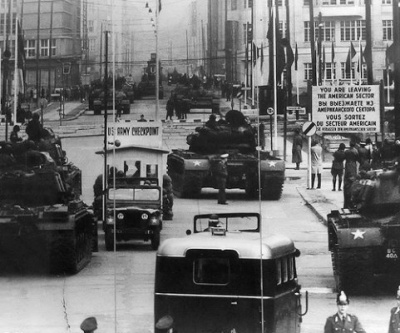Difference between revisions of "The Checkpoint Charlie standoff"
(Created page with "=== October 27, 1961 === 400px|thumbnail|left American officers are denied access to East Berlin. US tanks therefore arrive at checkpoint Charlie, short...") |
|||
| Line 1: | Line 1: | ||
=== October 27, 1961 === | === October 27, 1961 === | ||
[[File:20thoct27.jpg|400px|thumbnail|left]] | [[File:20thoct27.jpg|400px|thumbnail|left]] | ||
| − | American officers are denied access to East Berlin. US tanks therefore arrive at checkpoint Charlie, shortly followed by Soviet tanks facing them only 50 meters away. The Standoff lasts for sixteen hours until both sides step down. This incident directly triggers the Cuban missile crisis. This period of the Cold War is remembered as the closest point to a Nuclear War between the US and the USSR. | + | American officers are denied access to East Berlin. US tanks therefore arrive at checkpoint Charlie, shortly followed by Soviet tanks facing them only 50 meters away. The Standoff lasts for sixteen hours until both sides step down. This incident directly triggers the Cuban missile crisis. This period of the [[Cold War]] is remembered as the closest point to a Nuclear War between the US and the USSR. |
[[Category:20th Anniversary of German Reunification]] | [[Category:20th Anniversary of German Reunification]] | ||
Latest revision as of 09:09, 1 April 2014
October 27, 1961[edit]
American officers are denied access to East Berlin. US tanks therefore arrive at checkpoint Charlie, shortly followed by Soviet tanks facing them only 50 meters away. The Standoff lasts for sixteen hours until both sides step down. This incident directly triggers the Cuban missile crisis. This period of the Cold War is remembered as the closest point to a Nuclear War between the US and the USSR.
